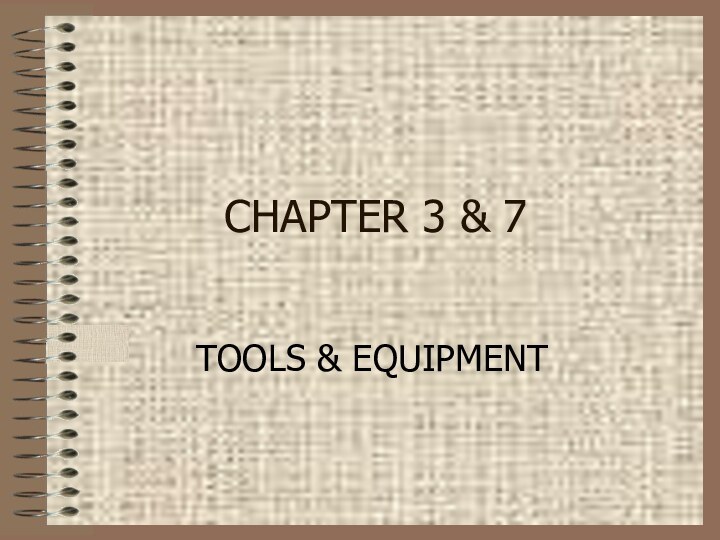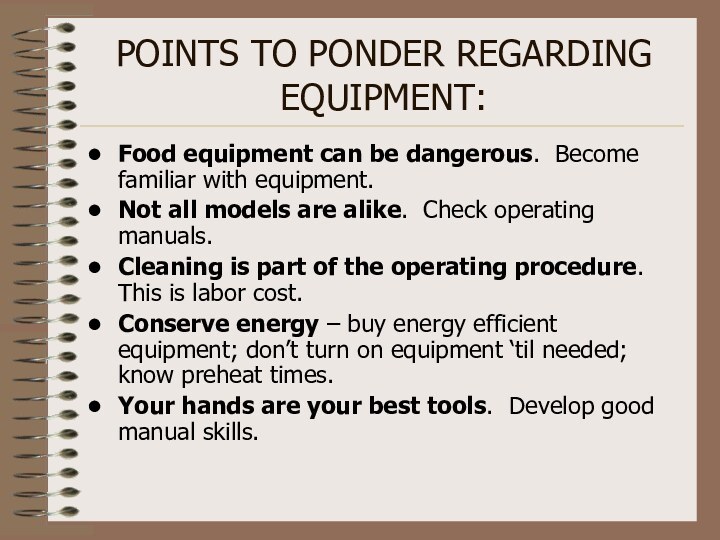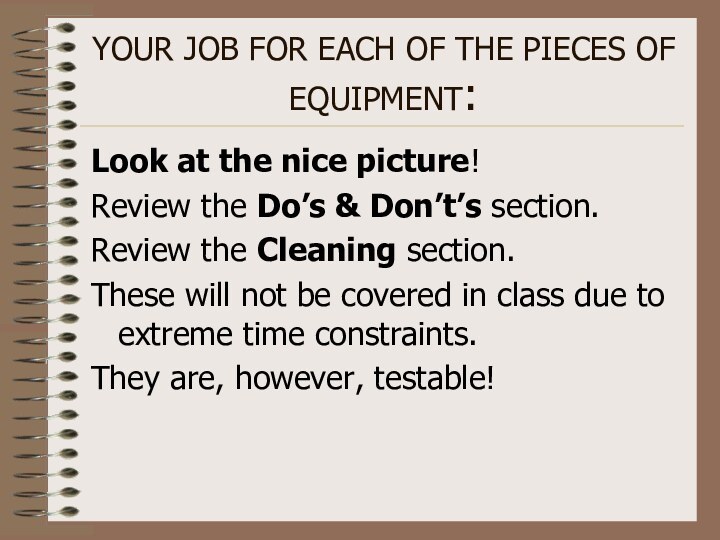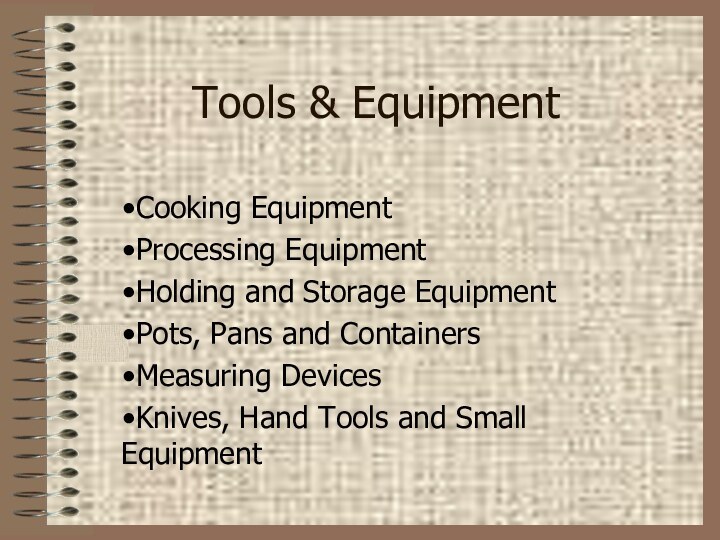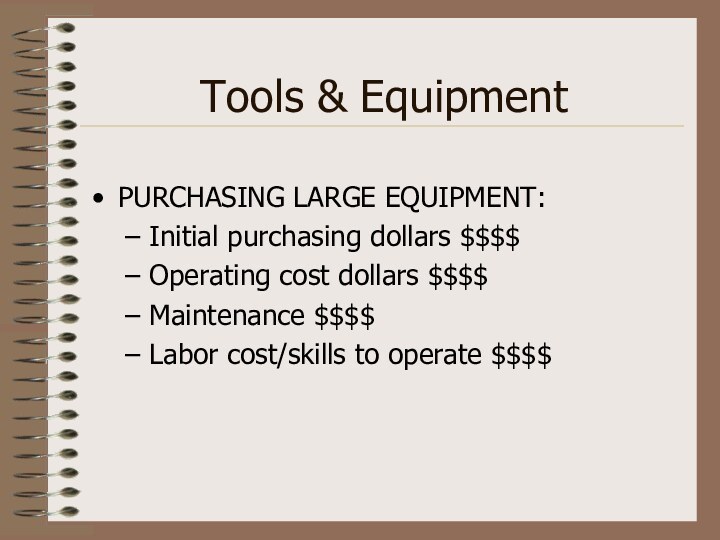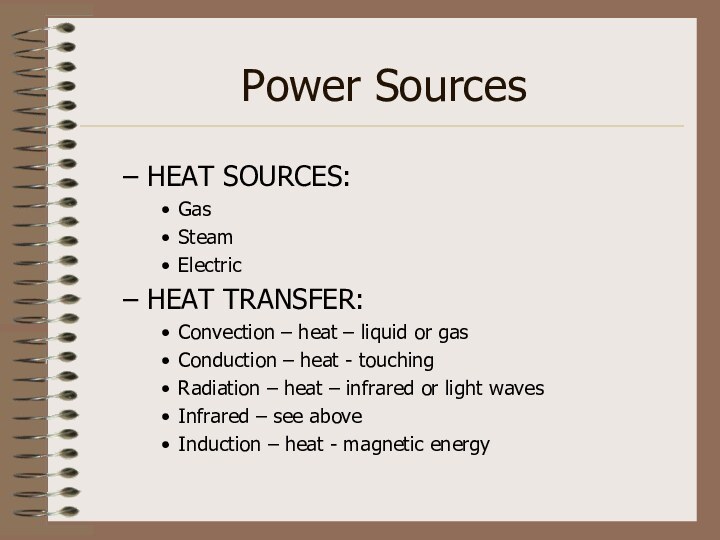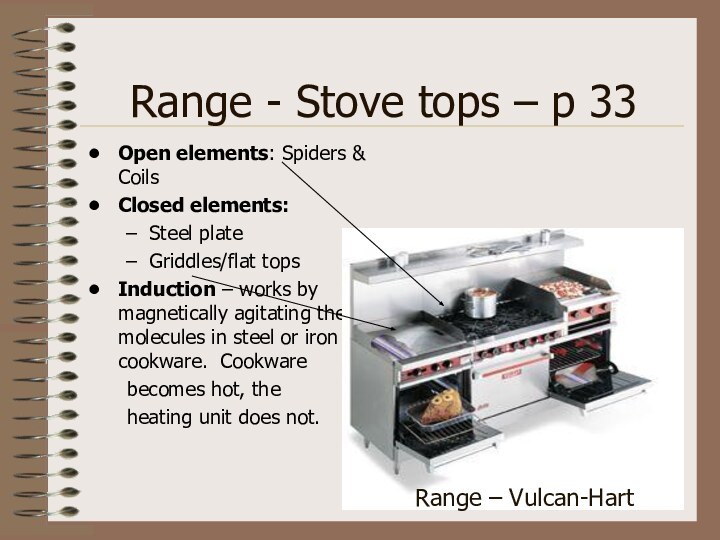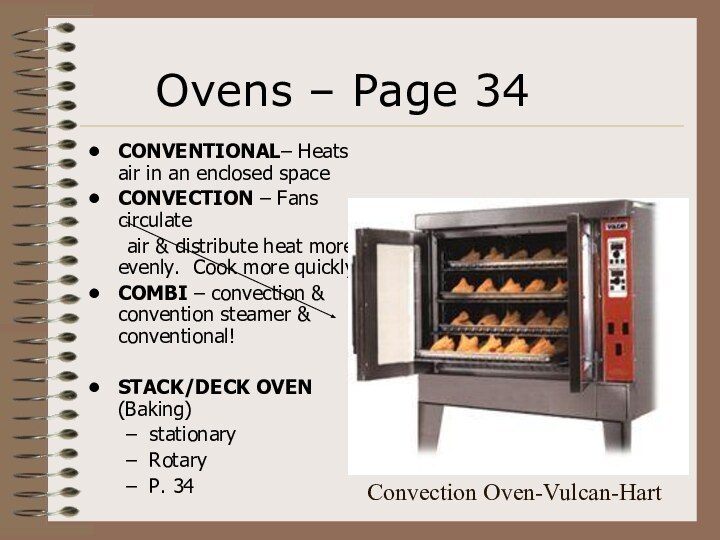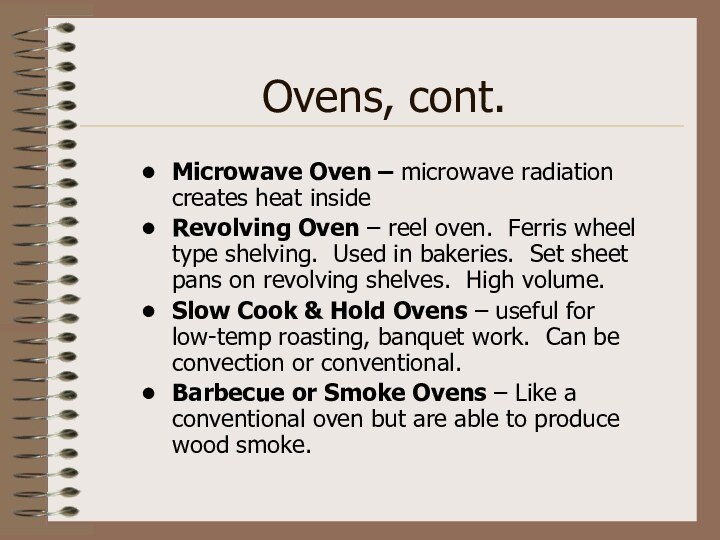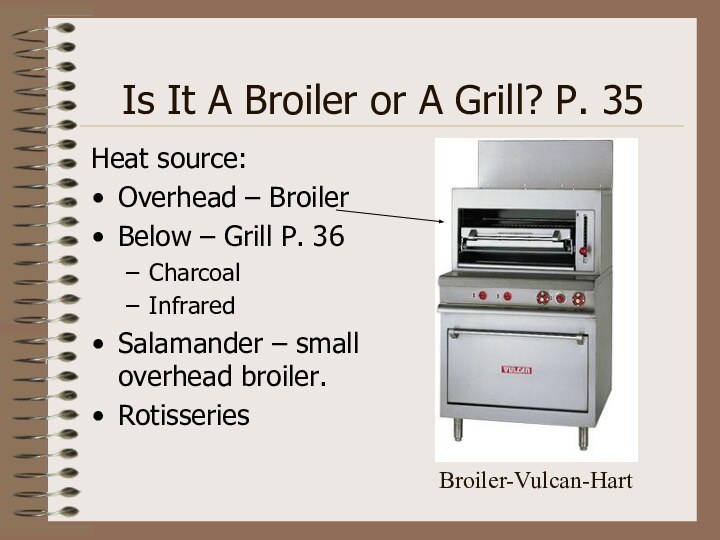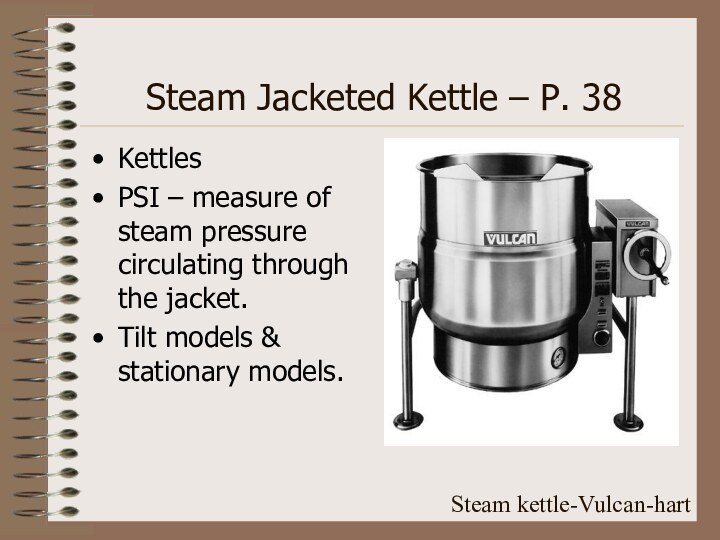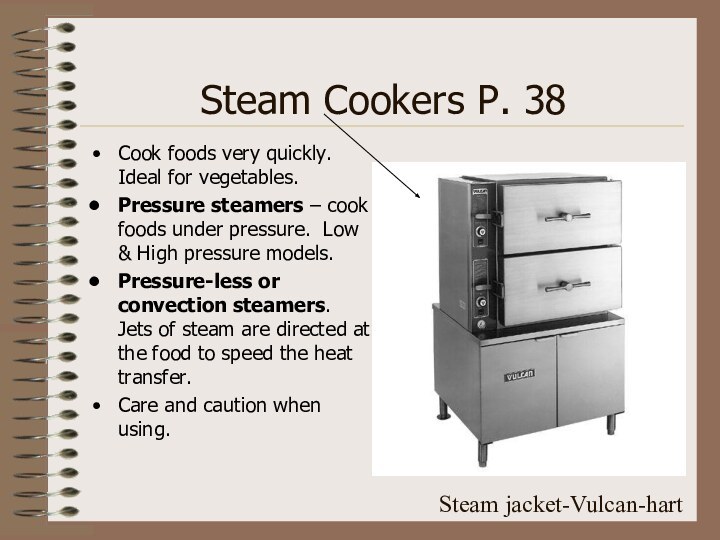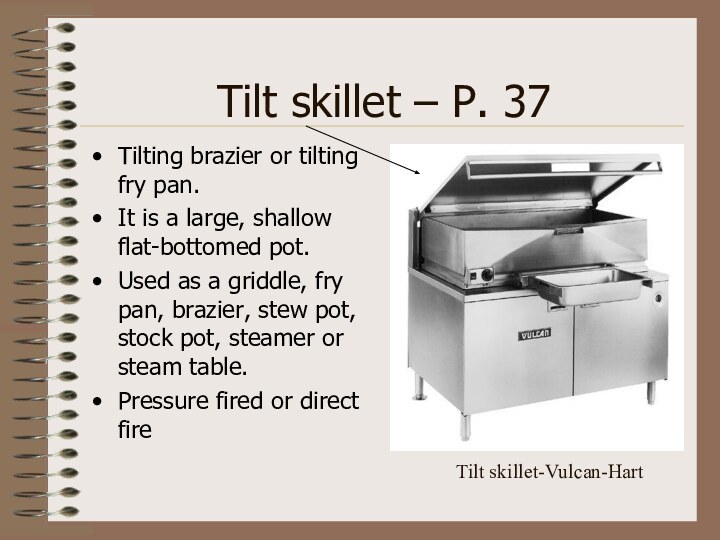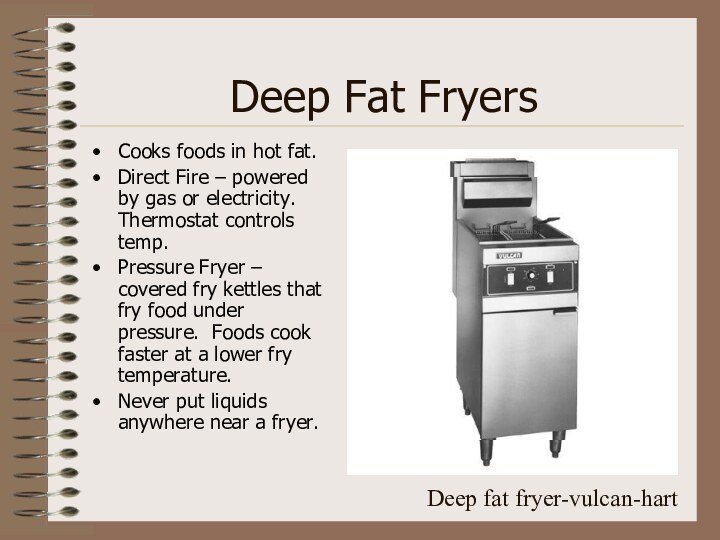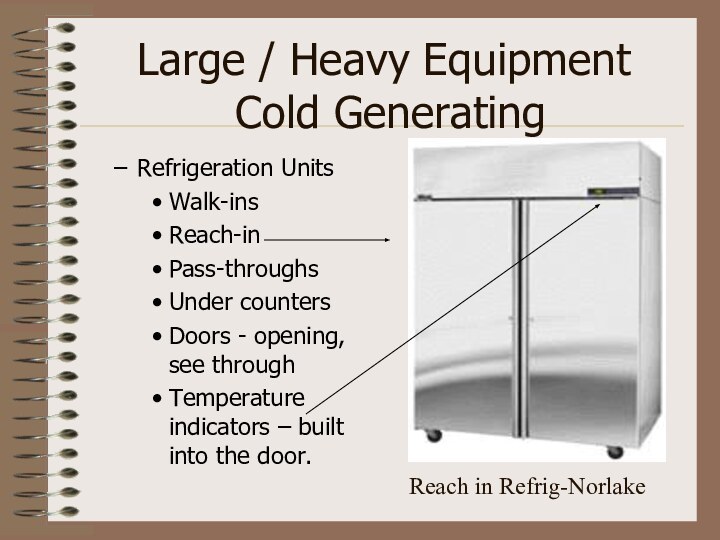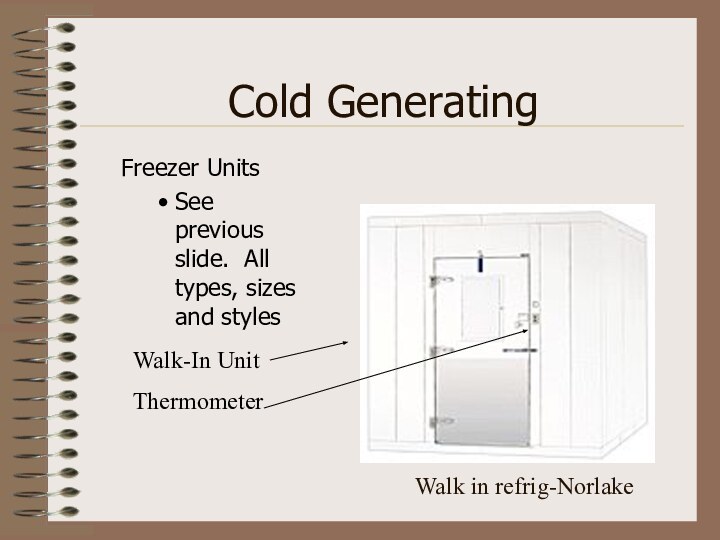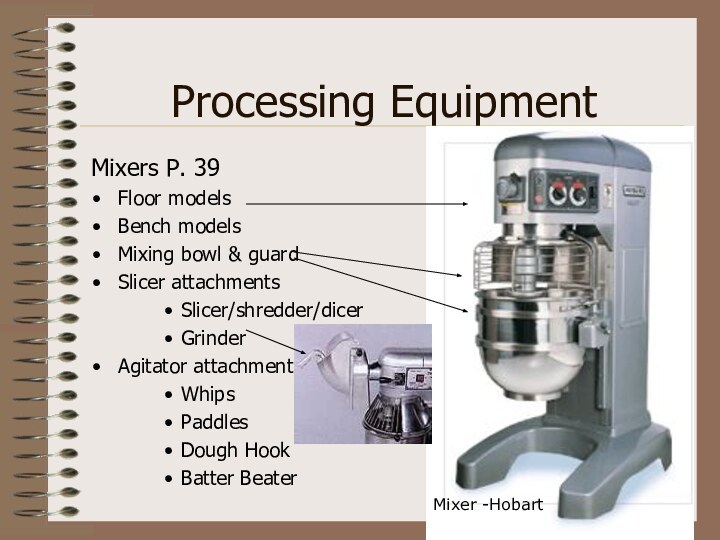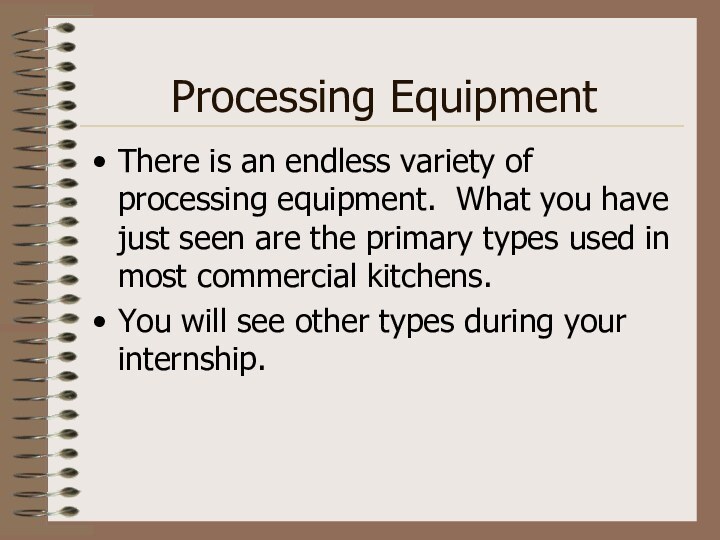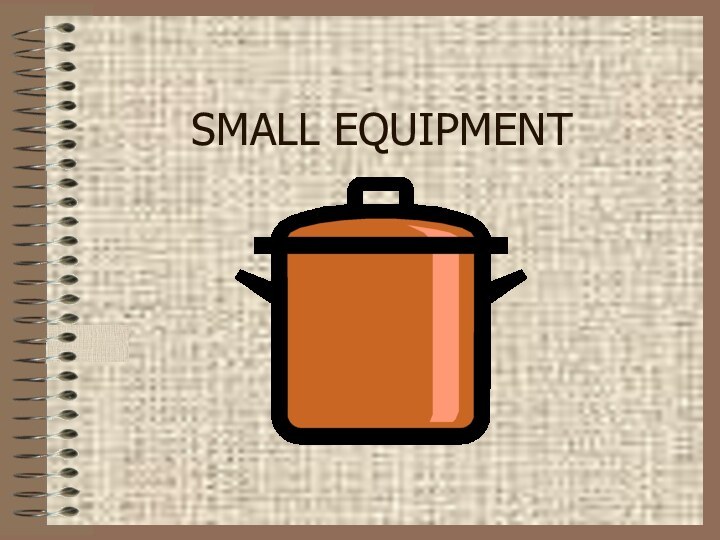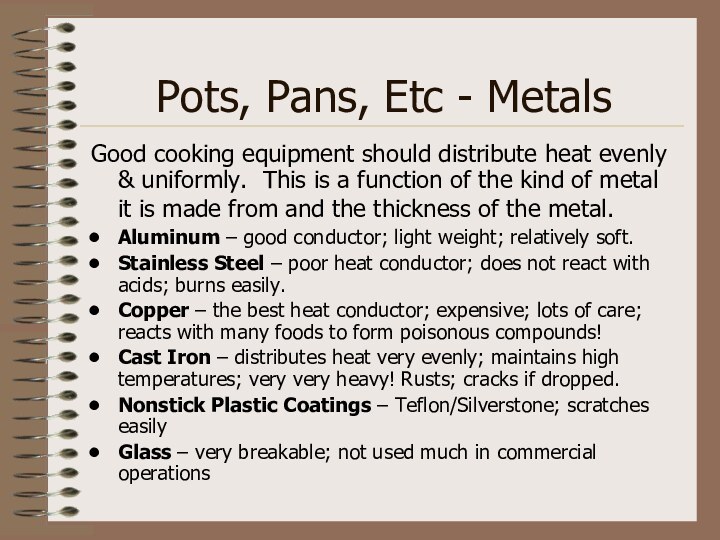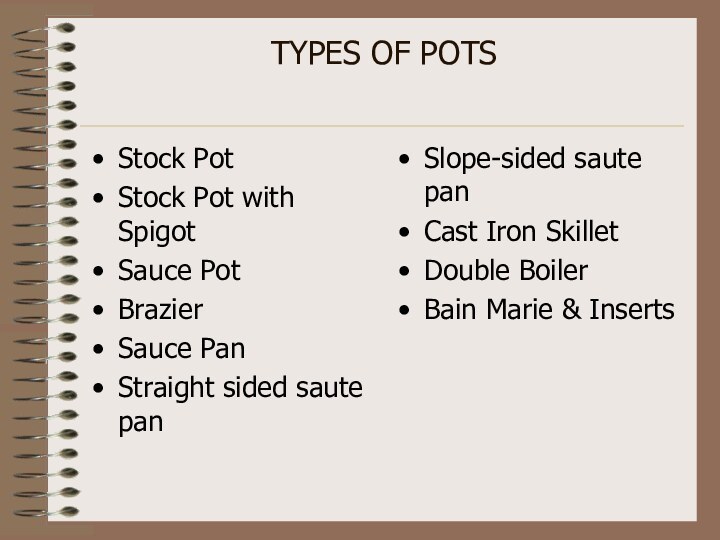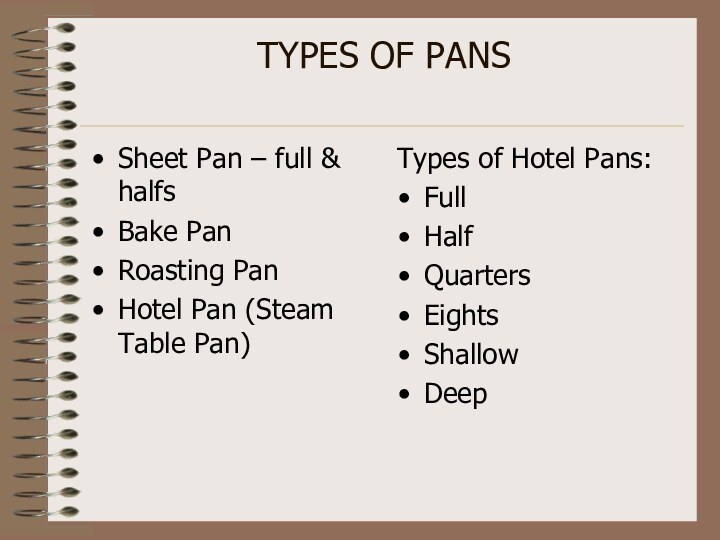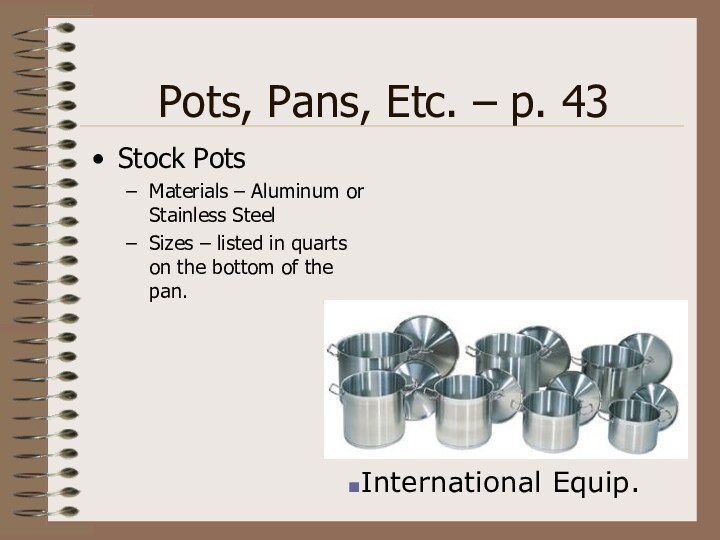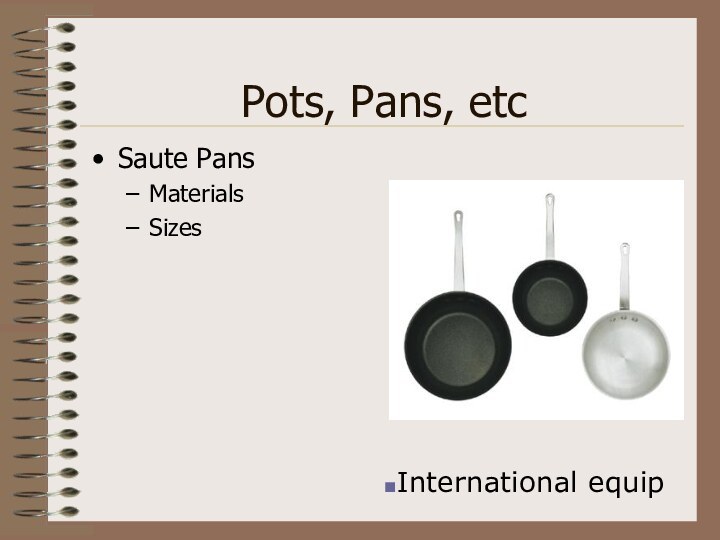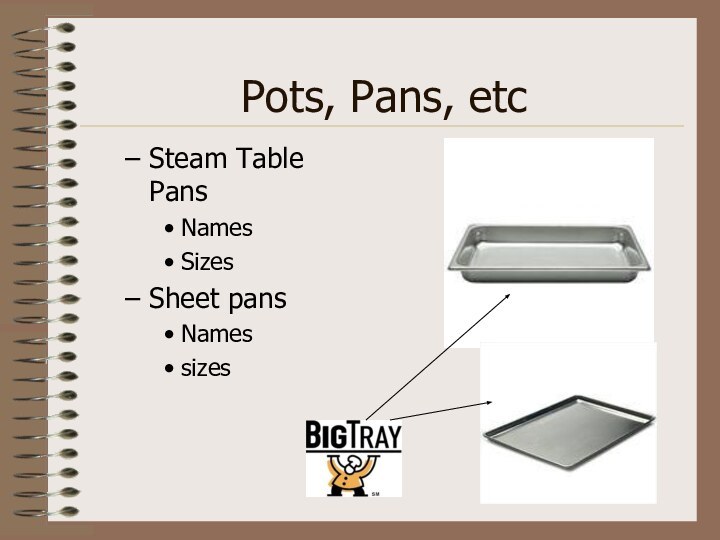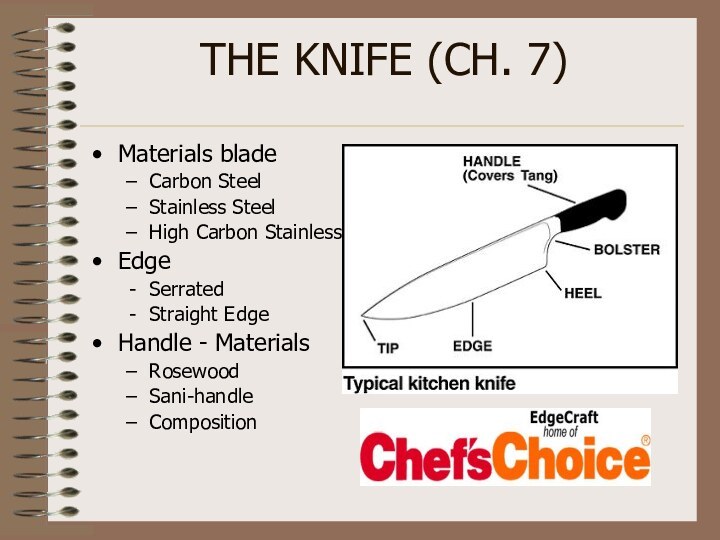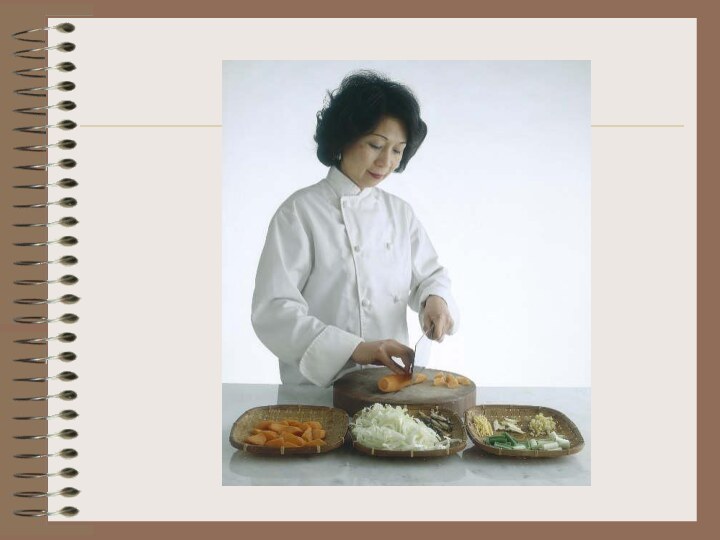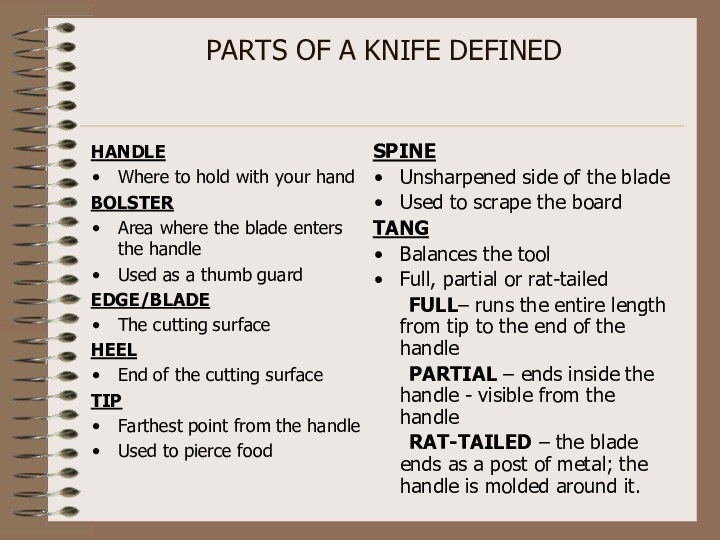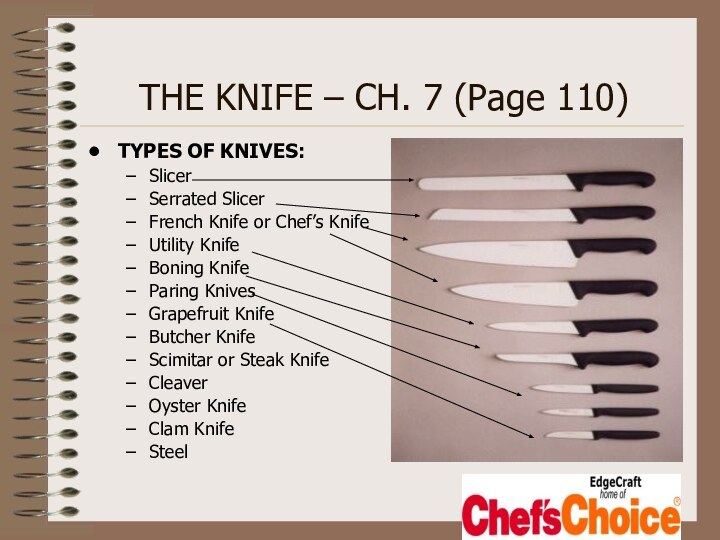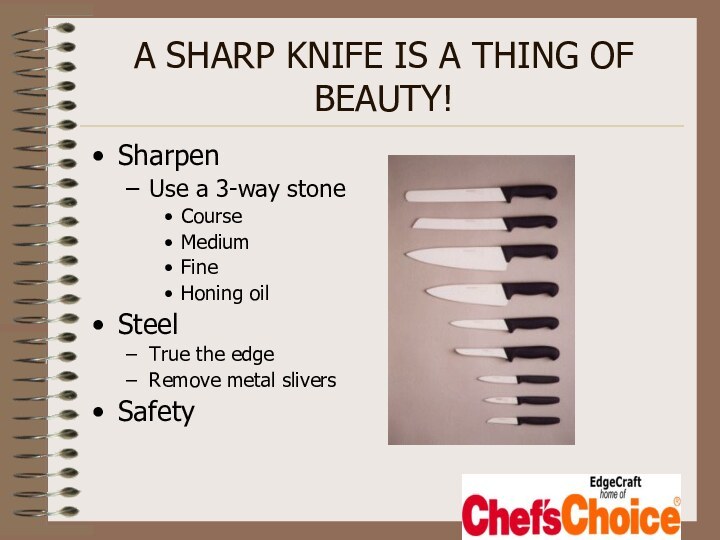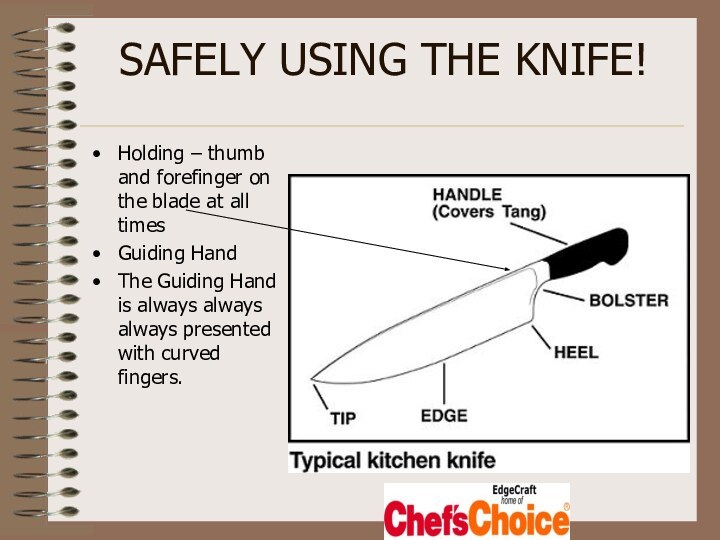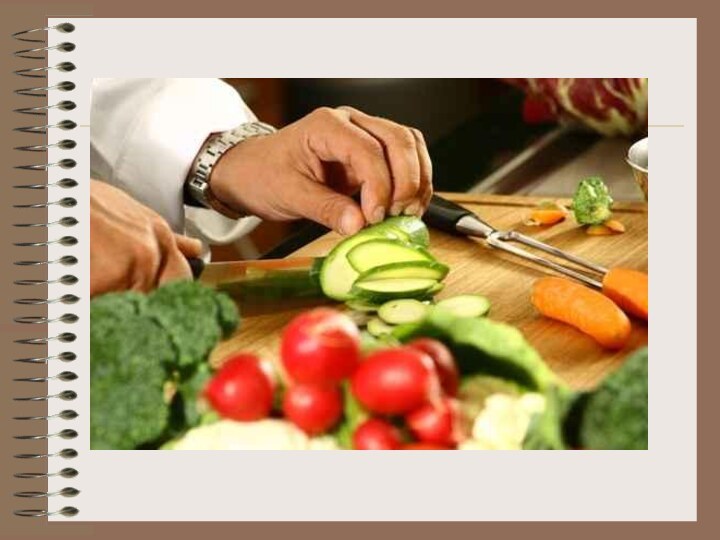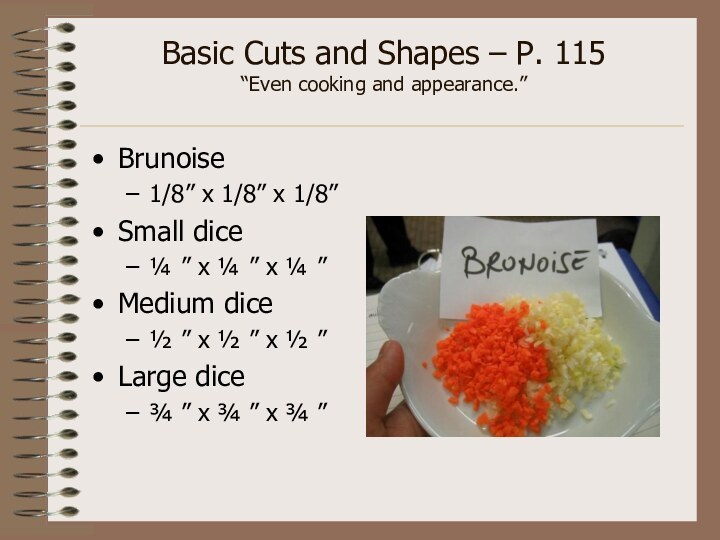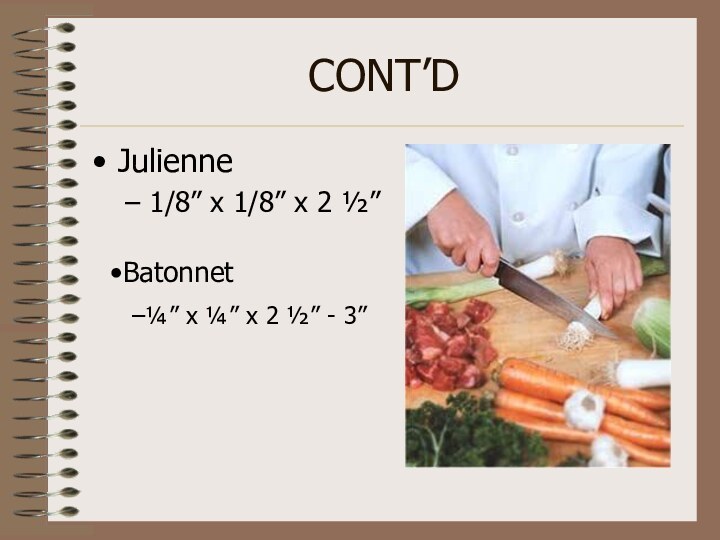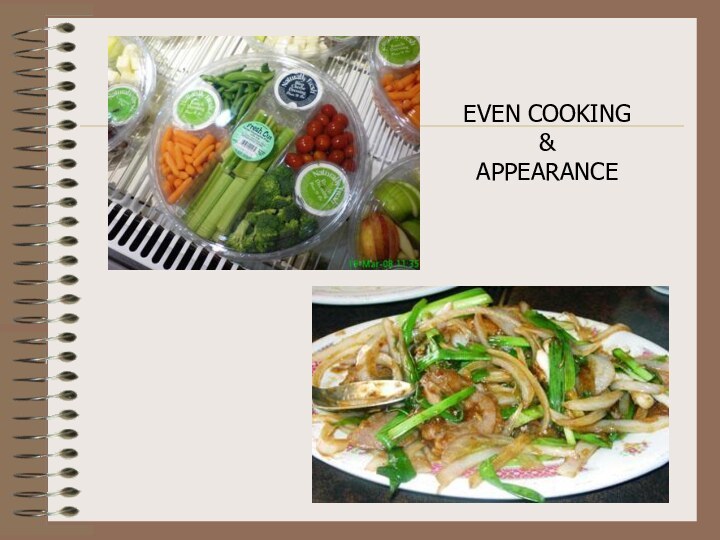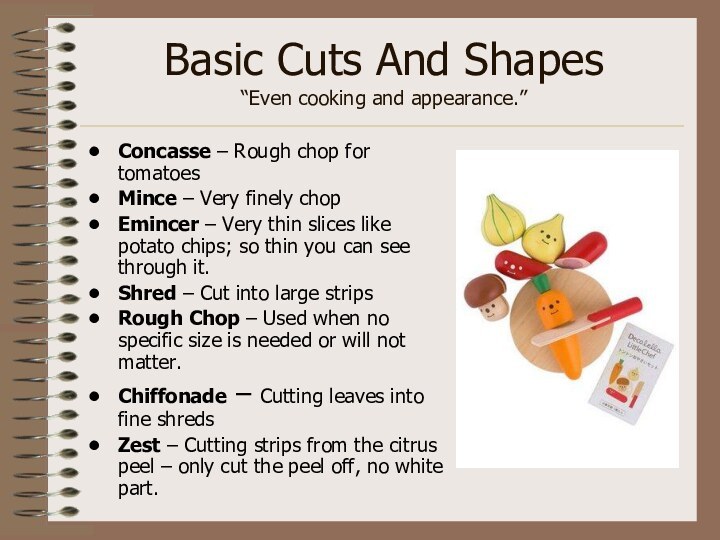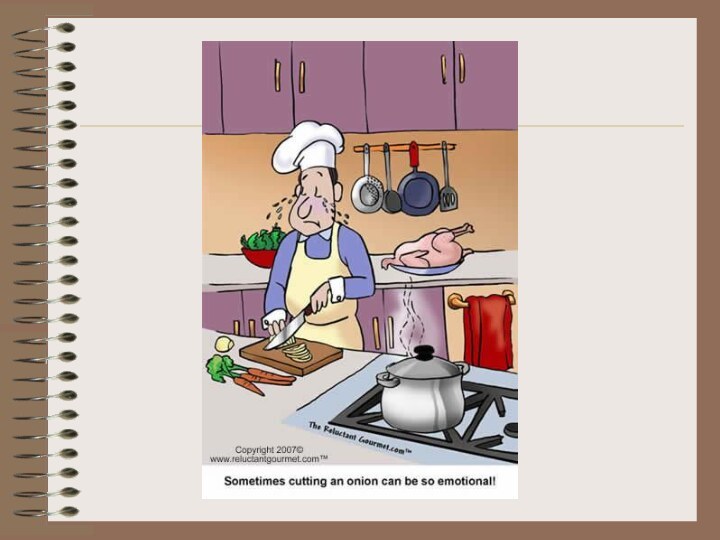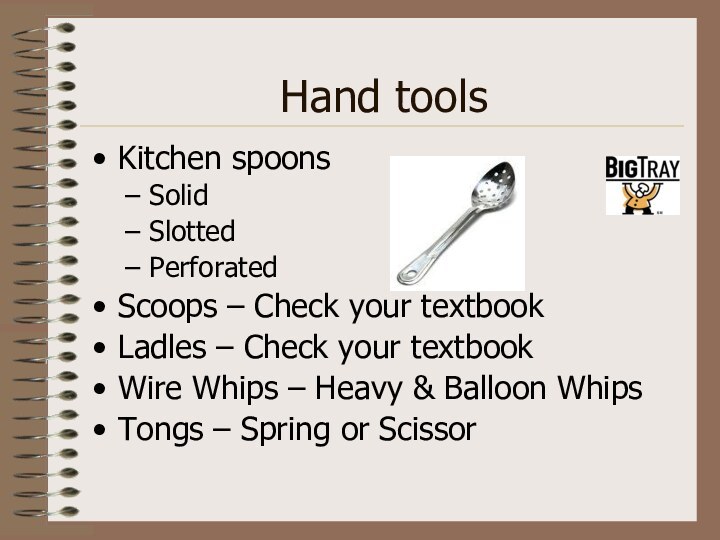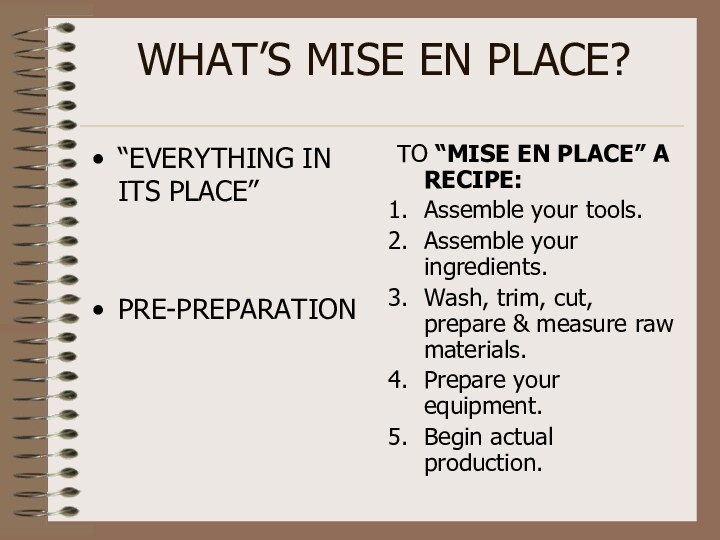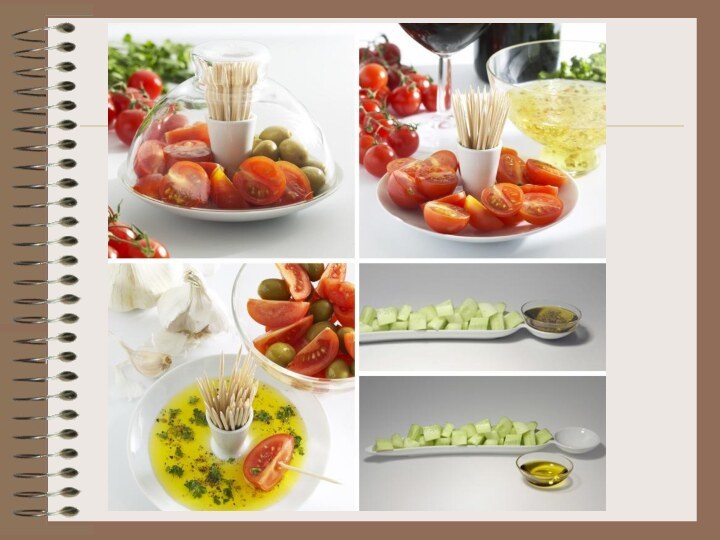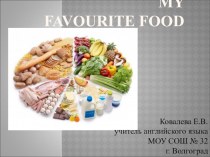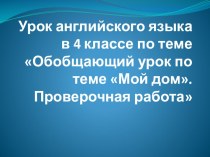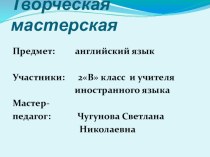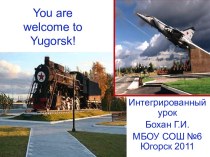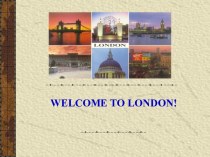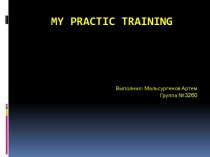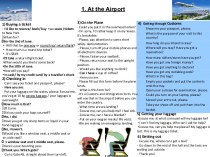Слайд 2
POINTS TO PONDER REGARDING EQUIPMENT:
Food equipment can be
dangerous. Become familiar with equipment.
Not all models are alike.
Check operating manuals.
Cleaning is part of the operating procedure. This is labor cost.
Conserve energy – buy energy efficient equipment; don’t turn on equipment ‘til needed; know preheat times.
Your hands are your best tools. Develop good manual skills.
Слайд 3
YOUR JOB FOR EACH OF THE PIECES OF
EQUIPMENT:
Look at the nice picture!
Review the Do’s & Don’t’s
section.
Review the Cleaning section.
These will not be covered in class due to extreme time constraints.
They are, however, testable!
Слайд 4
Tools & Equipment
Cooking Equipment
Processing Equipment
Holding and Storage Equipment
Pots,
Pans and Containers
Measuring Devices
Knives, Hand Tools and Small Equipment
Слайд 5
Tools & Equipment
PURCHASING LARGE EQUIPMENT:
Initial purchasing dollars $$$$
Operating
cost dollars $$$$
Maintenance $$$$
Labor cost/skills to operate $$$$
Слайд 6
Power Sources
HEAT SOURCES:
Gas
Steam
Electric
HEAT TRANSFER:
Convection – heat – liquid
or gas
Conduction – heat - touching
Radiation – heat –
infrared or light waves
Infrared – see above
Induction – heat - magnetic energy
Слайд 7
Range - Stove tops – p 33
Open elements:
Spiders & Coils
Closed elements:
Steel plate
Griddles/flat tops
Induction – works
by magnetically agitating the molecules in steel or iron cookware. Cookware
becomes hot, the
heating unit does not.
Range – Vulcan-Hart
Слайд 8
CONVENTIONAL– Heats air in an enclosed space
CONVECTION –
Fans circulate
air & distribute heat more evenly. Cook
more quickly.
COMBI – convection & convention steamer & conventional!
STACK/DECK OVEN (Baking)
stationary
Rotary
P. 34
Convection Oven-Vulcan-Hart
Ovens – Page 34
Слайд 9
Ovens, cont.
Microwave Oven – microwave radiation creates heat
inside
Revolving Oven – reel oven. Ferris wheel type shelving.
Used in bakeries. Set sheet pans on revolving shelves. High volume.
Slow Cook & Hold Ovens – useful for low-temp roasting, banquet work. Can be convection or conventional.
Barbecue or Smoke Ovens – Like a conventional oven but are able to produce wood smoke.
Слайд 10
Is It A Broiler or A Grill? P.
35
Heat source:
Overhead – Broiler
Below – Grill P. 36
Charcoal
Infrared
Salamander –
small overhead broiler.
Rotisseries
Broiler-Vulcan-Hart
Слайд 11
Steam Jacketed Kettle – P. 38
Kettles
PSI –
measure of steam pressure circulating through the jacket.
Tilt models
& stationary models.
Steam kettle-Vulcan-hart
Слайд 12
Steam Cookers P. 38
Cook foods very quickly. Ideal
for vegetables.
Pressure steamers – cook foods under pressure. Low
& High pressure models.
Pressure-less or convection steamers. Jets of steam are directed at the food to speed the heat transfer.
Care and caution when using.
Steam jacket-Vulcan-hart
Слайд 13
Tilt skillet – P. 37
Tilting brazier or tilting
fry pan.
It is a large, shallow flat-bottomed pot.
Used
as a griddle, fry pan, brazier, stew pot, stock pot, steamer or steam table.
Pressure fired or direct fire
Tilt skillet-Vulcan-Hart
Слайд 14
Deep Fat Fryers
Cooks foods in hot fat.
Direct Fire
– powered by gas or electricity. Thermostat controls temp.
Pressure
Fryer – covered fry kettles that fry food under pressure. Foods cook faster at a lower fry temperature.
Never put liquids anywhere near a fryer.
Deep fat fryer-vulcan-hart
Слайд 15
Large / Heavy Equipment
Cold Generating
Refrigeration Units
Walk-ins
Reach-in
Pass-throughs
Under counters
Doors
- opening, see through
Temperature indicators – built into the
door.
Reach in Refrig-Norlake
Слайд 16
Cold Generating
Freezer Units
See previous slide. All types, sizes
and styles
Walk in refrig-Norlake
Walk-In Unit
Thermometer
Слайд 17
Processing Equipment
Mixers P. 39
Floor models
Bench models
Mixing bowl &
guard
Slicer attachments
Slicer/shredder/dicer
Grinder
Agitator attachments
Whips
Paddles
Dough Hook
Batter Beater
Mixer -Hobart
Слайд 18
Processing Equipment
There is an endless variety of processing
equipment. What you have just seen are the primary
types used in most commercial kitchens.
You will see other types during your internship.
Слайд 20
Pots, Pans, Etc - Metals
Good cooking equipment should
distribute heat evenly & uniformly. This is a function
of the kind of metal it is made from and the thickness of the metal.
Aluminum – good conductor; light weight; relatively soft.
Stainless Steel – poor heat conductor; does not react with acids; burns easily.
Copper – the best heat conductor; expensive; lots of care; reacts with many foods to form poisonous compounds!
Cast Iron – distributes heat very evenly; maintains high temperatures; very very heavy! Rusts; cracks if dropped.
Nonstick Plastic Coatings – Teflon/Silverstone; scratches easily
Glass – very breakable; not used much in commercial operations
Слайд 21
TYPES OF POTS
Stock Pot
Stock Pot with Spigot
Sauce
Pot
Brazier
Sauce Pan
Straight sided saute pan
Slope-sided saute pan
Cast Iron Skillet
Double
Boiler
Bain Marie & Inserts
Слайд 22
TYPES OF PANS
Sheet Pan – full & halfs
Bake
Pan
Roasting Pan
Hotel Pan (Steam Table Pan)
Types of Hotel Pans:
Full
Half
Quarters
Eights
Shallow
Deep
Слайд 23
Pots, Pans, Etc. – p. 43
Stock Pots
Materials –
Aluminum or Stainless Steel
Sizes – listed in quarts on
the bottom of the pan.
International Equip.
Слайд 24
Pots, Pans, etc
Saute Pans
Materials
Sizes
International equip
Слайд 25
Pots, Pans, etc
Steam Table Pans
Names
Sizes
Sheet pans
Names
sizes
Слайд 26
THE KNIFE (CH. 7)
Materials blade
Carbon Steel
Stainless Steel
High Carbon
Stainless
Edge
Serrated
Straight Edge
Handle - Materials
Rosewood
Sani-handle
Composition
Слайд 28
PARTS OF A KNIFE DEFINED
HANDLE
Where to hold
with your hand
BOLSTER
Area where the blade enters the
handle
Used as a thumb guard
EDGE/BLADE
The cutting surface
HEEL
End of the cutting surface
TIP
Farthest point from the handle
Used to pierce food
SPINE
Unsharpened side of the blade
Used to scrape the board
TANG
Balances the tool
Full, partial or rat-tailed
FULL– runs the entire length from tip to the end of the handle
PARTIAL – ends inside the handle - visible from the handle
RAT-TAILED – the blade ends as a post of metal; the handle is molded around it.
Слайд 29
THE KNIFE – CH. 7 (Page 110)
TYPES OF
KNIVES:
Slicer
Serrated Slicer
French Knife or Chef’s Knife
Utility Knife
Boning Knife
Paring Knives
Grapefruit
Knife
Butcher Knife
Scimitar or Steak Knife
Cleaver
Oyster Knife
Clam Knife
Steel
Слайд 30
A SHARP KNIFE IS A THING OF BEAUTY!
Sharpen
Use
a 3-way stone
Course
Medium
Fine
Honing oil
Steel
True the edge
Remove metal slivers
Safety
Слайд 31
SAFELY USING THE KNIFE!
Holding – thumb and forefinger
on the blade at all times
Guiding Hand
The Guiding Hand
is always always always presented with curved fingers.
Слайд 33
Basic Cuts and Shapes – P. 115
“Even cooking
and appearance.”
Brunoise
1/8” x 1/8” x 1/8”
Small dice
¼ ” x
¼ ” x ¼ ”
Medium dice
½ ” x ½ ” x ½ ”
Large dice
¾ ” x ¾ ” x ¾ ”
Слайд 34
CONT’D
Julienne
1/8” x 1/8” x 2 ½”
Batonnet
¼” x ¼”
x 2 ½” - 3”
Слайд 36
Basic Cuts And Shapes
“Even cooking and appearance.”
Concasse –
Rough chop for tomatoes
Mince – Very finely chop
Emincer –
Very thin slices like potato chips; so thin you can see through it.
Shred – Cut into large strips
Rough Chop – Used when no specific size is needed or will not matter.
Chiffonade – Cutting leaves into fine shreds
Zest – Cutting strips from the citrus peel – only cut the peel off, no white part.
Слайд 38
Hand tools
Kitchen spoons
Solid
Slotted
Perforated
Scoops – Check your textbook
Ladles
– Check your textbook
Wire Whips – Heavy & Balloon
Whips
Tongs – Spring or Scissor
Слайд 39
WHAT’S MISE EN PLACE?
“EVERYTHING IN ITS PLACE”
PRE-PREPARATION
TO “MISE
EN PLACE” A RECIPE:
Assemble your tools.
Assemble your ingredients.
Wash, trim,
cut, prepare & measure raw materials.
Prepare your equipment.
Begin actual production.
